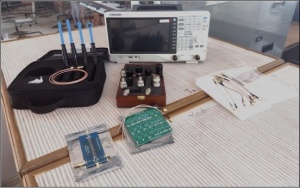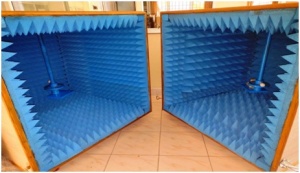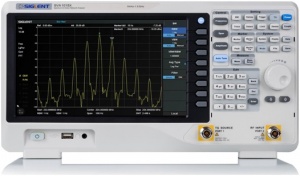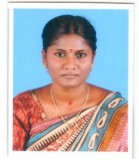R & D Cell
Research and Development
Welcome to the NEC Research and Development Cell
The Research and Development Cell of Nandha Engineering College has been established to promote research activities. The Cell will monitor and administer research programs offered by Anna University, Chennai. It will evaluate and oversee the candidates admitted to research programs in Anna University recognized departments of the institution.
At Nandha Engineering College, all departments are recognized as research centers under research institute recognition. Scholars from various institutions, as well as faculty from this college who wish to enhance their qualifications, conduct their research work within their respective disciplines. Details of infrastructure, publications, and related research activities are presented in the respective disciplines.
Dr. C.N. Marimuthu, M.E., Ph.D.
Professor (ECE) & Dean (R&D)
Nandha Engineering College
Erode – 638 052.
Research Policy
Nandha Engineering College (Autonomous) is committed to serve the society by conducting state of art research on par with the national and international standards. Our college creates an open platform to foster academic excellence and to pursue scholarly research activities. Researchers will abide by the research policy of the Institute in accordance with the two key principles namely, Quality and Ethics. They are also responsible for ensuring that the research practices are carried out in conformance with the Anna University research policy.
Academic Research
1. Norms for Doctor of Philosophy (Ph.D.)
- Candidates should enroll and register at Nandha Engineering College on getting provisional registration letter from Anna university and renew their registration during second week of January / July every semester. For full time scholars, every day attendance is preferred.
- Candidates should present his / her progress of research in the review meeting once in six months during third week of January / July and submit the Half Yearly Progress Review Report to the department in which they have registered. The schedule for the review meeting would be prepared and announced by the concerned department.
- The faculty after the award of Ph.D., shall get the guideship within 3 years. A supervisor, at any point of time, can guide 8 scholars at the maximum (including joint supervisor-ship). However, the number of full-time scholars to the supervisors can be limited by the institution time to time based on the infrastructure availability. Prior approval / permission should be obtained when there arises a need to guide more than the stipulated number of scholars under special / extraordinary / circumstances.
- The Supervisors shall endorse the candidates to publish their research work. The candidate shall publish their research paper in reputed (Anna University Annexure / Scopus/ SCI/SCI-E/ESCI, Indian Citation Index) indexed conferences / Workshops / Journals) after obtaining formal permission from the respective Supervisor. The form should enclose both the paper and the Urkund report of the paper. Only after checking for Plagiarism, the Research supervisor can sign the form and permit the candidate to submit the paper to the journal.
- The research scholar shall submit a copy of Ph.D. thesis to the College Library on successful completion of the Viva-Voce.
2. Plagiarism Check
- All research supervisors recognized by Anna University will have login ID for online access to Urkund Plagiarism detection software by Centre for Research, Anna University, Chennai.
- Research Scholar should submit the copy of Urkund plagiarism check report to the concern supervisor for a paper before submitting to the journal / Conference.
- The research scholar Synopsis/ Thesis should accompany Urkund plagiarism report while submitting same to Center for Research, Anna university
3.The Act of Plagiarism
- In the case of scholars who have committed the act of plagiarism in the Thesis / journal publication, his / her Thesis / degree shall be forfeited and his / her research registration shall be cancelled and also he / she shall be debarred to register for any other programme in the University.
- For the abetment of above such action, the recognition of his / her Supervisor ship shall be withdrawn for a period of five years and he / she shall be debarred from guiding the scholars for any research programme in the University till such period.
- If any scholar has committed an act of self plagiarism in the publications and ascertained by the Committee, such work shall not be allowed in his / her thesis and the scholar shall be fined up as per the affiliating university, while the Supervisor shall also face action. The Synopsis / Thesis of such scholar shall be accepted only based on a new publication in a referred journal (as applicable).
- If plagiarism is detected in the Publications / Thesis of any other scholar under the same supervisor, the recognition of his / her Supervisor ship shall be withdrawn for a period of five years and he / she shall be debarred from guiding the scholars, besides other disciplinary action.
- Providing generous seed funding to the Faculty members to publish their research findings in refereed Journal / Conference.
- Providing international travel grant to faculty and students to enable them to participate and present papers in International Conferences or to attend the internship training in an emerging area.
4. Sponsored / Collaborative Research Project
- The faculty shall apply for funding support from the Govt / Industries, to do Sponsored / Collaborative research based on the call for proposals from the agencies.
- A Department Level Proposal Review Committee / Project Review Committee (PRC) shallbe constituted that comprises of Principal Investigator, Subject Expert, Dean / HOD for proposal assessment.
- The PRC shall forward the proposals upon review to the Principal for approval towards the submission of proposals to the funding agencies
- The Principal Investigator shall then submit the application along with supporting documents based on the approval to the Funding Agencies.
- The PIs shall create a new Head of Account and prepare a Stock Register with proper entries of purchase of recurring and Non-Recurring items upon sanction of the project by the funding agency.
- The PIs shall appoint a Project fellow (if applicable) by means of advertising and then selection shall be done by conducting the interview based on the budget approval of the funding agency. The interview panel should be constituted with one external expert member along with PI and HOD.
- The PIs shall attend the Progress Review Meeting (Once in six months) conducted by the Progress Review Committee that comprises of Principal, Dean-R&D and expert members. The PIs shall submit the Annual Progress Review Report to the funding agencies as per the guidelines.
- The PIs shall prepare Project Completion Report on completion of the project duration according to the guidelines of the funding agency.
- The PIs shall prepare the Utilization Certificate (UC) duly signed by the Auditor.
- The PIs shall submit the Project Completion Report, Utilization Certificate and Publications / patent list to the Sponsoring agency through the Dean and the Principal.
Remuneration Policy for Consultancy, Testing and Sponsored Research projects
Faculty members who are doing Consultancy, Testing and Sponsored Research projects are entitled to get remuneration as per the following norms.
Consultancy and Testing Assignments
- The consultancy charges shall be shared as 20:80 for the College and the faculty members respectively.
- The testing charges are shared as 40:60 for the College and the faculty members respectively.
- The maximum remuneration is capped at Rs.1.00 lakh per project per faculty member.
- The faculty members who are going for consultancy and testing work outside during the College working days are entitled to apply for on duty leave.
- The faculty members who are going for testing work outside the College should get necessary out pass from the department and College.
Sponsored Projects
Clause 1
- Faculty members who do sponsored research are entitled to get remuneration as per the guidelines of Sponsoring Agencies.
- The maximum remuneration is capped at Rs.1.00 lakh per project per faculty member.
Clause 2
- For consultancy projects sponsored by government agencies, the project Principal Investigator (PI) is entitled to get the actual expertise charges as approved in the financial budget.
Clause 3
- The faculty members are eligible for project remuneration only after getting the completion certificate / approval of the final Utilization Certificate from the sponsoring agency.
Research Grant sanctioned details
| S. No. | Sanctioning Year | Name of the funding agency & Scheme | Title of the event | Name of the coordinator | Amount sanctioned NR R | Sanctioned letter details | |
| 1 | 2009-2010 | AICTE/MODROB | Electronics System Design | M.Anto Bennet/ECE | 950000 | 8024/RID/BOR/MOD-421/2009-10 dated 21.12.09 | |
| 2 | 2009-2010 | AICTE/SDP | Advanced Techniques in Network Security | Dr.S.Arumugam/CSE | 700000 | 1-78/FD/SDP(189)/08-09 | |
| 3 | 2009-2010 | AICTE/SDP | LABVIEW Based Control System | V.K.Shanmuganathan | 700000 | 1-78/FD/SDP(249)/08-09 | |
| 4 | 2009-2010 | AICTE/SEMINAR | Green Engine | V.K.Shanmuganathan | 60000 | 1-4/RID/SEM s(131)/2009-10 | |
| 5 | 2010-2011 | AICTE/SDP | Next generation networks | Dr.S.Arumugam/CSE | 420000 | RIFD/SDP/52/2010-11 dated 15.4.11 | |
| 6 | 2010-2011 | AICTE/SDP | Embedded applications for drives | R.Rajaraman | 420000 | RIFD/SDP/53/2010-11 dated 15.4.11 | |
| 7 | 2010-2011 | AICTE/SEMINAR | Enterprise computing | Dr.S.Arumugam/CSE | 150000 | RIFD/SEM/64/2010-11 dated 23.2.11 | |
| 8 | 2010-2011 | AICTE/SEMINAR | Mech. Medallians’11 | Dr.V.R.Sampath/MECH | 150000 | RIFD/SEM/65/10-11 dated 15.4.11 | |
| 9 | 2011-2012 | AICTE/EDC | EDC Scheme | Dr.P.Sathyapriya | 200000 | 200000 | RIFD/EDC(28)/2011-12 dated 15.1.12 |
| 10 | 2011-2012 | AICTE/MODROBS | Renovation of FOC lab | Dr.S.Arumugam/CSE | 750000 | 8024/RIFD/MOD-213(Pvt)/Policy-III/2011-12 dated 29.2.12 | |
| 11 | 2011-2012 | AICTE/MODROBS | Special electrical Machines | R.Rajaraman | 800000 | 8024/RIFD/MOD/21411-12 dated 14.2.12 | |
| 12 | 2012-2013 | AICTE/FDP | Real time applications in Embedded systems | Dr.C.N.Marimuthu/ECE | 490000 | RIFD/FDP/P(1)-75/2012-13 dated 12-12-2012 | |
| 13 | 2013-2014 | AICTE/SEMINAR | Bio –Degradable materials | Dr.P.Jayanthi/EEE | 200000 | 7-57/ RIFD/SEM/policy-1 /2013-14 dated 25-07.2013 | |
| 14 | 2013-2014 | CSIR/seminar | Recent trends in Nano technology and its applications to Energy sector | Dr.S.Ravi/EEE | 30000 | SYM/8228/13-HRD dated 27-08-2013 | |
| 15 | 2013-2014 | CSIR/Workshop | Recent Trends in SolarElectric Conversion Systems | Dr.S.Ravi/EEE | 30000 | SYM/7876/12-HRD dated 28-02-2013 | |
| 16 | 2014-2015 | CSIR/seminar | Recent trends in production and effective utilization techniques of Bio –fuels in Energy sector | Dr.A.Satheesh/EEE | 30000 | SYM/8493/13-HRD dated 27-01-2014 | |
| 17 | 2014-2015 | DST-SERB/ workshop | Challenges in Bio – compatibility of implantable materials and mechanical behavior. | Dr.M.Easwaramoorthi/MECH | 30000 | SB/SS/370/14-15 DATED 02-07-2014 | |
| 18 | 2014-2015 | DST-NIMAT PROJECT | Entrepreneurship awareness camps (EAC) | J Mageswaran/MBA | 20000 | EDI/DST-NIMAT/13-14/119 DATED 14-07-2014 | |
| 19 | 2014-2015 | AU-FDP | EE 2353 High Voltage Engineering | Dr.A.Satheash & P.Krishnaganthi/EEE | Self supporting | 19/CFD/WINTER/FDTP/Category-III/ 2014-76 (FDP) | |
| 20 | 2014-2015 | MNRE- SEMINAR | National seminar on ‘Smart grid and Distributed power generation” | Dr.A.Satheash & C.Gokul/EEE | 79000 | IFD/2259/201-2015 Dated 11/03/2015 | |
| 21 | 2015-2016 | IETE | National conference on ‘NCACIS’15” | Dr.C.N.Marimuthu & R. Murugasamy/ECE | 5000 | IETE SALEM SUB CENTRE | |
| 22 | 2015-2016 | DEITY | IP Awareness Workshop | Dr.N.Shanthi/CSE | 200000 | DEITY/IPR/10(73)/2015 Dated 15/02/2016 | |
| 23 | 2015-2016 | ISTE | One day National Seminar on “Latest phase change materials for solar energy production” | Dr.M.Eswaramoorthy/MECH | 10000 | ISTE | |
| 24 | 2015-2016 | IETE | National Conference on Advanced Computational Intelligence System | Dr.C.N.Marimuthu/ECE | 5000 | IETE-Erode Center | |
| 25 | 2015-2016 | ISRO | Seminar on “GIS solutions for highway traffic management”. | Dr.E.K.Mohanraj/CIVIL | 40000 | ISRO/RES/C-S/2015-16Dated 24/03/16 | |
| 26 | 2015-2016 | INSA | Research perspectives on power quality monitoring and mitigation in future smart grids. | Dr.A.Satheesh & Mr.Jayakumar/EEE | 30000 | SP/C-18/2016-17 Dated 04/04/16 | |
| 27 | 2015-2016 | DeitY/NCW | Legal awareness programme about women related laws | Dr.N.santhi/CSE | 50000 | NCW/1202112006232/LAP2015-16/95 | |
| 28 | 2015-2016 | EDI | Entrepreneurship Awareness Camp(EAC) | Prof.N.Devarajan/MBA | 40000 | EDI/DST-NIMAT/16-17/195 | |
| 29 | 2016-2017 | DST-SERB | Global Perspectives of Data Science with open source software tools: R and Python | Dr.N.Shanthi/CSE | 100000 | SB/SS/238/16-17 Dated 21/07/2016 | |
| 30 | 2016-2017 | DST-SERB | Recent trends and challenges in power electronic converters for smart grid interface of renewable energy system | T.Jayakumar/EEE | 100000 | SB/SS/935/16-17 Dated 17/10/2017 | |
| 31 | 2016-2017 | ISRO | 4 Ps of Flood using Remote Sensing & GIS | Dr.E.K.Mohanraj/CIVIL | 30000 | DOS/PAO/GIA/2016-2017/191/891 | |
| 32 | 2016-2017 | National Human Rights Commission | Human Rights for Students | Dr.N.Shanthi/CSE | 50000 | 23011/125/2016-2017/Trg | |
| 33 | 2016-2017 | EDI | Entrepreneurship Awareness Camp(EAC) | Prof.N.Devarajan/MBA | 40000 | EDI/DST-NIMAT/16-17/RLS-1/204 | |
| 34 | 2016-2017 | IETE | ICRIETM’17 | Dr.C.N.Marimuthu/ECE | 5000 | Dated 25.03.2017 | |
| 35 | 2016-2017 | NABARD | Innovative Approach on the use of ICT’s for Sustainable Agriculture and Rural Development | Dr.N.Santhi/CSE | 8000 | NB.TN.DEAR/Sansction Letter/Seminar/2016 | |
| 36 | 2016-2017 | ISTE | Solar Thermal cooling System | Dr.Eswaramoorthi/MECH | 5000 | Dated 20.08.2016 | |
| 37 | 2017-2018 | TNSCST | Benefits of Naural fertilizer in Agriculture | Dr.M.Chandrasekaran/S&H | 15000 | TNSCST/POP.SCI/AR/02/2017-2018/2565 | |
| 38 | 2017-2018 | ICMR | Sociteal Awareness Program on Cardio Vascular Disease – Symptoms & Remedial Features | Dr.C.N.Marimuthu/ECE | 30000 | ICMR No.7/454/17-Seminars(HRD) | |
| 39 | 2017-2018 | AICTE-FDP | Deep Learning and its Applications in Machine Vision and Robotics | Dr.N.Santhi/CSE | 620000 | AICTE F.No.6-96/RIFD/FDP/Policy-1/2016-17 | |
| 40 | 2017-2018 | AICTE-RPS | Designa and Development of Proton Exchange Memberane Fuel Cell with Novel Cathode flow Field For Better Water Management and High Performance | Dr.N.Rengarajan/ECE | 2100000 | 370588 | File No.8-33/RIFD/RPS/Policy-1/2016-2017 |
| 41 | 2017-2018 | CSIR | Applications of Artificial intelegence for capmpacting cyper crimes | Dr S.Arumugam Mrs Maheswari/CSE | 30000 | SYM/9262/17-HRD dated 23/6/2017 | |
| 42 | 2017-2018 | AICTE-PMKVY | Led Light Repair technician | Dr.C.N.Marimuthu | 364500 | AICTE-PMKVY TI/2017-2018 | |
| 43 | 2017-2018 | AICTE-PMKVY | Plumber General | Dr.E.K.Mohanraj P.Karthika P.Shankar/CIVIL | 364500 | AICTE-PMKVY TI/2017-2018 | |
| 44 | 2017-2018 | AICTE-PMKVY | Mason General | K.Selvi P.Karthika G.Amirthagadeshearan/CIVIL | 405000 | AICTE-PMKVY TI/2017-2018 | |
| 45 | 2017-2018 | National Human Rights Commission | Training programme on Human Rights for Students | Mr.N .Devaraj Mrs D.Shanthi/MBA | 50000 | F.NO.23011/107/2017-2018, Dated 02-11-2017 | |
| 46 | 2017-2018 | ICMR | Technological Evolution in senso Equipment for Medical Appliation | Dr.K.Ramesh Mr.Mohammed Imran/IT | 40000 | No:7/930/17-Seminars(HRD) | |
| 47 | 2017-2018 | National Commission for Women | Challenges and Psychological Aspects of Women left Behind Farmers Suicide | Dr.M.Eswaramoorthy/MECH | 128000 | 16(159)/2017-2018/NCW(SCW) | |
| 48 | 2017-2018 | TNSCST-SPS | Government | R Pradheepa | 10000 | TNSCST/SPS/AR/2017-18 Dated: 27-01-2018 | |
| 49 | 2017-2018 | TNSCST-SPS | Government | G Prabhakaran | 10000 | TNSCST/SPS/AR/2017-18 Dated: 27-01-2018 | |
| 50 | 2017-2018 | TNSCST-SPS | Government | S.Jagadeeshan | 10000 | TNSCST/SPS/AR/2017-18 Dated: 27-01-2018 | |
| 51 | 2017-2018 | TNSCST-SPS | Government | Dr M Eswaramoorthi | 8600 | TNSCST/SPS/AR/2017-18 Dated: 27-01-2018 | |
| 52 | 2017-2018 | National Commission for Women | Nation Wide Competetion to create awareness about the legal rights of women | Dr.M.Eswaramoorthy Ms.V.Subhashini/MECH | 24938 | F.No.09 (2017-18) /NCW/NEC Dated 31-08-2017 | |
| 53 | 2018-2019 | National Human Rights Commission | Training Programme on Human Rights for Students | Mr.N.Devaraj Mrs. D.Shanthi | 50000 | F.No.23011/107-2018,Dated 02-11-2017 | |
| 54 | 2018-2019 | CSIR | Awareness Programme on E-Waste handling and recycling techniques | Mr.Ramraj/EEE | 20000 | SYM/9698/18-HRD, Dated; 13-07-2018. | |
| 55 | 2018-2019 | EDI | Entrepreneurship Awareness Camp(EAC) | Dr.B.Girimurugan/MBA | 40000 | EDI/DST-NIMAT/18-19/353 | |
| 56 | 2018-2019 | IETE | ICRIETM’18 | Dr.C.N.Marimuthu/ECE Dr.M.Eswaramoorthy/ Mech | 5000 | AICTE-PMKVY TI/2018-2019 | |
| 57 | 2018-2019 | AICTE-PMKVY TI | Solar Panel Installation Technician | Dr.C.N.Marimuthu R.Murugasami N.Manikandaprabu/ECE | 255000 | AICTE-PMKVY TI/2018-2019 | |
| 58 | 2018-2019 | AICTE-PMKVY TI | CCTV Installation Technician | Dr.C.N.Marimuthu R.Murugasami N.Manikandaprabu/ECE | 382500 | AICTE-PMKVY TI/2018-2019 | |
| 59 | 2018-2019 | AICTE-PMKVY TI | Draughtsman- Mechanical | Dr.M.Eswaramoorthy | 216750 | AICTE-PMKVY TI/2018-2019 | |
| 60 | 2018-2019 | AICTE-PMKVY TI | CNC Operator | Dr.M.Eswaramoorthy | 153000 | AICTE-PMKVY TI/2018-2019 | |
| 61 | 2018-2019 | CSIR | Water Borne Diseases- Causes & its Prevention | Dr.E.K.Mohanraj | 15000 | SYM/9792/18-HRD, Dated; 19-09-2018. | |
| 62 | 2018-2019 | CSIR | Challenges issue & Possible S0lutions in Futur Smart Grid Integration of Renewal Energy System. | Mr.Jayakumar | 30000 | SYM/9954/18-HRD, Dated; 04-12-2018. | |
| 63 | 2018-2019 | ISRO | Recent Developments in Smart Forming based on Internet of Things and Robotics | Dr S.Kavitha | 40000 | DS-2B-13012(1)/9/2019-Sec.II | |
| 64 | 2018-2019 | AICTE-STTP | STTP-Professional Development of Educators in Teaching Pedagogy – A Learning & Research Design | Dr.C.N.Marimuthu/ECE | 288000 | F.No.34-56/ 147/RIFD/STTP/Policy-1/2017-2018, Dated:04.01.2019 | |
| 65 | 2018-2019 | AICTE-STTP | STTP-An Integrated Aprroach of Engineers towards: Water,Food, Energy and Climate nexus in Changing World | Dr.E.K.Mohanraj/Civil | 280000 | F.No.34-56/ 145/RIFD/STTP/Policy-1/2017-2018, Dated:04.01.2019 | |
| 66 | 2018-2019 | AICTE-STTP | STTP-Wireless Sensor networks : application towards Secured Automation with IoT | Dr.C.Siva/IT | 221000 | F.No.34-56/ 91/RIFD/STTP/Policy-1/2017-2018, Dated:04.01.2019 | |
| 67 | 2018-2019 | AICTE- FDP | FDP-Fostering Morals,Values, Ethics and Character Building in Technical Education | Dr.V.Manimegalai/MBA | 463000 | F.No.34-55/ 15/RIFD/STTP/Policy-1/2017-2018, Dated:09.01.2019 | |
| 68 | 2018-2019 | AICTE-GOC | Grant for Organizing Conference | Dr.S.Arumugam/CSE | 500000 | F.No.67-96/RIFD/FDP/Policy-1/2017-2018, Dated:26.02.2019 | |
| 69 | 2018-2019 | TNSCST-SPS | Student Project | G Prabhakaran | 7500 | TNSCST/SPS/AR/2018-19 Dated: 18-02-2019 | |
| 70 | 2018-2019 | TNSCST-SPS | Student Project | B Velliyangiri | 7500 | TNSCST/SPS/AR/2018-19 Dated: 18-02-2019 | |
| 71 | 2018-2019 | IETE-GOC | ICRIETM’19 | Dr.C.N.Marimuthu/ECE Dr.M.Eswaramoorthy/ Mech | 5000 | Dated 24.03.2019 | |
| 72 | 2019-2020 | EDI | Entrepreneurship Awareness Camp(EAC) | Mr. Tamilarasu /MBA | 40000 | EDI/DST-NIMAT/18-19/353 dated 12.8.2019 | |
| 73 | 2019-2020 | TNSCST | National seminar on Green Chemistry and its relevence to Society | Prof.G.Mohankumar/ Chemical | 15000 | TNSCST/PFA/SSW/VR/48/2019-2020 Dared 4.10.2019 | |
| 74 | 2019-2020 | NCW | Legal Awareness programme 2019-2020 | Dr.M.Eswaramoorthi /Mech | 90000 | 16(79)/2019-2020/NCW(LAP) dated 20.11.2019 | |
| 75 | 2019-2020 | AICTE-RPS | Experimental Investigation and modeling of WO3, ZnO and Graphene Nano particles in the field of Bio Medical applications | Dr.S.Kavitha | 463333 | 81765 | F.No.8-222/ RIFD/RPS/Policy-1/2018-2019, Dated:22.11.2019 |
| 76 | 2019-2020 | AICTE-MODROB | Cloud base Virtual Computing for open source software Teaching and Research | Dr.P.Thirumoorthy. | 776900 | 137100 | F.No.9-307//RIFD/MODROM/Policy-1/2018-2019, Dated:04.12.2019 |
| 77 | 2019-2020 | AICTE-STTP | Data Science with R Tool | Dr.S.Arumugam | 359666 | F.No.34-65/ 130/RIFD/STTP/Policy-1/2018-2019, Dated:04.12.2019 | |
| 78 | 2019-2020 | DST SERB | Contemporary pracitices inE-Mobility and Smarter solutions for Indian transport System | Dr.M.Eswaramoorthi /Mech | 50000 | F.No.SSY/2020/000020 DATED 04-02-2020 | |
| 79 | 2019-2020 | AICTE-GOC | Grant for Organizing Conference | Dr.C.N.Marimuthu/EC E | 166667 | F.No.67-29/RIFD/FDP/Policy-5/2019-2020, Dated:24.06.2020 | |
| 80 | 2019-2020 | TNSCST-SPS | Student Project | P Vanitha | 7500 | TNSCST/SPS/AR/2019-20 Dated: 18-03-2020 | |
| 81 | 2019-2020 | TNSCST-SPS | Student Project | P Karthika | 7500 | TNSCST/SPS/AR/2019-20 Dated: 18-03-2020 | |
| 82 | 2019-2020 | TNSCST-SPS | Student Project | Dr M Eswaramoorthi | 7500 | TNSCST/SPS/AR/2019-20 Dated: 18-03-2020 | |
| 83 | 2019-2020 | TNSCST-SPS | Student Project | Dr M K Murthi | 7500 | TNSCST/SPS/AR/2019-20 Dated: 18-03-2020 | |
| 84 | 2020-2021 | AICTE -RPS | Designing a Fully Textile FractalMonopole Wearable Antenna forMedical Imaging Applications | Dr.C.N.Marimuthu/EC E | 11,28,375 | 3,76,125 | F.No.8-33/ FDC/RPS/Policy-1/2021-2022, Dated:18.02.2022 |
| 85 | 2021-2022 | CSIR | Emerging advancements in Battery technology for future Elecric vVehicle Applications | Dr Jayakumar/EEE | 30000 | SYM/10687/21-HRD, Dated; 25-11-2021. | |
| 86 | 2021-2022 | TNSCST( Capacity Building) | Science and Technology for industrial needs | Dr C.Siva/IT | 150000 | TNSCST/S&T CAPACITY 2020-21/4831 Dated: 27-12-2021 | |
| 87 | 2021-2022 | TNSCST-SPS | Student Project | M.Rabi Ahamed | 7500 | TNSCST/SPS/2021-2022 Dated: 11-03-2022 | |
| 88 | 2021-2022 | TNSCST-SPS | Student Project | Dr .E.k.Vellingiriraj | 7500 | TNSCST/SPS/2021-2022 Dated: 11-03-2022 | |
| 89 | 2021-2022 | TNSCST-SPS | Student Project | Dr.S.Vanitha | 7500 | TNSCST/SPS/2021-2022 Dated: 11-03-2022 | |
| 90 | 2021-2022 | TNSCST-SPS | Student Project | K.Rajasekaran | 7500 | TNSCST/SPS/2021-2022 Dated: 11-03-2022 | |
| 91 | 2021-2022 | TNSCST-SPS | Student Project | Dr .R.Murugasami | 7500 | TNSCST/SPS/2021-2022 Dated: 03-03-2023 | |
| 92 | 2021-2022 | MSME | Roll and Pull uprooting Machine | Subramanian D/I-Club | 1500000 | F.No. 6 ( 1 9) /ReleaseGOI to HEIs(Private) /2020-21 dated 03.08.2021 | |
| 93 | 2022-2023 | MSME | Smar solar Waste Segregation and Management system using Internet of Things | KrishnaGandhi P/ EEE | 1475000 | F.No. 6 (19) /Sanctiont to CNA /Incubation /2022-23 dated 17.08.2022 | |
| 94 | 2022-2023 | TNSCST-SPS | Student Project | Dr .E.k.Vellingiriraj | 7500 | TNSCST/SPS/2022-2023 Dated: 03-03-2023 | |
| 95 | 2022-2023 | TNSCST-SPS | Student Project | M.Prabu | 7500 | TNSCST/SPS/2021-2022 Dated: 03-03-2023 | |
| 96 | 2022-2023 | CSIR | Research perspectives on New Materials for next generation of Lithium-Ion Batteries for extreme fast charging Electric Vehicle applications | Dr T.Jayakumar/ EEE | 20000 | SYM/12064/23-HRD Dated 06.04.2023 | |
| 97 | 2022-2023 | IEI-ELC | One day Workshop on Advances in Robotics | Dr C.N.Marimuthu | 5000 | IEI-ELC/SG/2022-2023/32 dated 17.05.2023 | |
| 98 | 2022-2023 | IEEE Computer Society | Busness plan Competition | KrishnaGandhi P/ EEE | 83000 | E Brookes Little CAE CMP Associate Program Director, Technical Activities& Governance | |
| 99 | 2023-2024 | MSME | Yield Enhancement for paddy field using Supervisory Control and Data Acquisition system with Machine Learning Technique | A.Vishnu A P/ Mech | 1400000 | F.No. 6 ( 1 9) /Sanctiont to CNA /Incubation /2022-23 dated 08.08.2023 | |
| 100 | 2023-2024 | MSME | Artificial lntelligence based Fuel cell powered Electric vehicle with high performance, on-board charging and zero emissions for eco-friendly environment | Dr M.Muthukumar P/ Mech | 1500000 | F.No. 6 ( 1 9) /Sanctiont to CNA /Incubation /2022-23 dated 08.08.2023 | |
| 101 | 2023-2024 | IE(I) Erode Local Centre | Insights in to Data Science and its applications in Cyber Security | Dr P.Thirumoorthy/ CSE Dr S.Karuppusamy/CSE | 5000 | IEI-ELC/SG/2023-24/32 DATED 27.10.2023 | |
| 102 | 2023-2024 | MSME | Artificial intelligence based multi cavity bagasse cup making machine with human machine interface | Dr G.Ramani Prof/EEE | 1500000 | IDEATN012486 | |
| 103 | 2023-2024 | MSME | Solar operated harmful pollutants to water converter at traffic signals using suction three-way catalytic converte | M.Sneha | 1500000 | IDEATN016433 | |
| 104 | 2023-2024 | MSME | Degradable and non-degradable garbage automation system using IOT | P.Maheshwari | 1500000 | IDEATN013074 | |
| 105 | 2023-2024 | MSME | Solar powered smart wellness suit for traffic / guarding police officers or guards with adoptable temperature control unit and alert system using artificial intelligence | M.Sneha | 1500000 | IDEATN016487 | |
| 106 | 2023-2024 | TNSCST-SPS | Design and Development of Low cost 3D Printer for Sustaiable urban Forming | Dr M.Eswaramoorthi | 7500 | TNSCST/SPS/2023-2024/3106A/01 Dated: 101.10.2024 | |
| 107 | 2023-2024 | TNSCST-SPS | IoT Based Mine Workers safety Monitoring and Controlling system | Mrs. V.Gunasundari | 7500 | TNSCST/SPS/2023-2024/3106A/01 Dated: 101.10.2024 | |
| 108 | 2024-2025 | AICTE- ATAL – ONLINE FDP | Innovative Approaches to Energy Sustainability and Climate Resilience : Teaching and Research Stategies for a Greener Future | Dr.D.Ambika Dr.K.K.Suvain | 100000 | November 6,2024 | |
| 109 | 2024-2025 | TNSCST – Seminar | Exploring the Impact of 5G Newtwok on the IoT Networks | Mrs. C. Navamani Mr. S. Jagadeesan | 20000 | Letter No:16853/TNSCST/SSW-2023-24-071/VM/2024 DAated 29.10.2024 | |
| 110 | 2024-2025 | TIH foundation for IOT &IOU | IoT – driven boiler management system for optimized Turmeric processing and Defect detection | Dr. M. Easwaramoorthi Mr. K. Pradeepkumar | Provisionally Selected | ||
| 111 | 2024-2025 | AICTE | IDEA LAB | Dr. U. S. Ragupathy Dr. M. Eswaramoorthi Dr. K. Lalitha | 2000000 | 1000000 | File no; M/676/2025-SAGB/IDEA2024000009,Dated 11.02.2025 |
| 112 | 2024-2025 | NEC-CFIR Seed fund | IoT – driven boiler management system for optimized Turmeric processing and Drying | Dr. M. Easwaramoorthi Mr. K. Pradeepkumar MRs.P.Santhiyadevi | 40000 | 10000 | NEC/R7D/CFIR/2024-25/SEED GRANT/PROJECT 09, Dated 18.12.2024 |
| 113 | 2024-2025 | NEC-CFIR Seed fund | Completely Degradable Ecological Ganesh Idols | Mr.V.Chandramohan Mr.R.Thiruneelakandan Mr.K.Anandhu | 14000 | 16000 | NEC/R7D/CFIR/2024-25/SEED GRANT/PROJECT 01, Dated 18.12.2024 |
| 114 | 2024-2025 | NEC-CFIR Seed fund | Approaches to enhance Soil Fertility: Earthworm Optimization through Integrated Nutrient Pellets for Sustainable Agriculture | Dr.K.K.Suvain, Dr.T.Jayanalina, Ms.S.Vanisha, | 12000 | 18000 | NEC/R7D/CFIR/2024-25/SEED GRANT/PROJECT 02, Dated 18.12.2024 |
| 115 | 2024-2025 | NEC-CFIR Seed fund | A Recommendation System For the Implementation of Electronic Health Record Maintenance For Patients in the Fitness Band | Dr.K.Lalitha Dr.M.Karthikeyan | 10000 | 5000 | NEC/R7D/CFIR/2024-25/SEED GRANT/PROJECT 03, Dated 18.12.2024 |
| 116 | 2024-2025 | NEC-CFIR Seed fund | Development of an Eco-Friendly and Automated Sanitary pad Disposal System | Mr.A.Srithar Dr.M.Dhipa Dr.M.Manikandan | 20000 | 10000 | NEC/R7D/CFIR/2024-25/SEED GRANT/PROJECT 04, Dated 18.12.2024 |
| 117 | 2024-2025 | NEC-CFIR Seed fund | Investigation the Antibacterial,Antiviral,and Ant Diabetic Properties of pyridine Derivatives: Pioneering Therapeutic Solution for Human Well-Being | Dr.T.Jayanalina Dr.K.S.Mohan | 14000 | 16000 | NEC/R7D/CFIR/2024-25/SEED GRANT/PROJECT 06, Dated 18.12.2024 |
| 118 | 2024-2025 | NEC-CFIR Seed fund | Battery Thermal Management System For Fuel Cell Electric Vehicle | Dr.M.Muthukumar Ms.R.Saranya | 26000 | 24000 | NEC/R7D/CFIR/2024-25/SEED GRANT/PROJECT 07, Dated 18.12.2024 |
| 119 | 2024-2025 | NEC-CFIR Seed fund | Humanooid Robot Using Generative AI and IoT Educational Assistance | Mr.A.NeevenKanth Dr.T.Rajasekaran Ms.N.Bhuvaneswari | 9000 | 1000 | NEC/R7D/CFIR/2024-25/SEED GRANT/PROJECT 08, Dated 18.12.2024 |
| Rs.93,13,608/- | Rs.2,46,89,199/- | Total Amount Rs. 3,40,02,807/- | |||||
R & D CODE OF ETHICS
CODE OF ETHICS
Nandha Engineering College (NEC) is keen to restoring and maintaining highest standards of honesty and liability in carrying out academic and research activities within the campus.
Objectives of Ethical Committee
- Ensure the highest scientific and ethical standards of research at NEC.
- Ensure the highest scientific and ethical standards of research at NEC
- Normative ethics- includes determining what is right and wrong
- Compliance- includes instituted policies and regulations at the university
- Rigor and reproducibility – only kind of science that can offer social value and justify risks to subjects and financial investment in research.
- Social Value- means that research addresses problems of importance to society, generating knowledge used to solve real-world problems through new technologies or procedures.
Misconduct in Academic Research
Fabrication and falsification of data, plagiarism, or dishonesty in proposing, conducting, or presenting scientific results are all examples of academic research misconduct. Academic misconduct also includes deliberate, dangerous, or negligent deviations from accepted research practice, such as flouting an agreed protocol if and when this failure provokes absurd risk or harm to people or the environment, and when it facilitates research misconduct by collusion in, or concealment of, such actions by others.
Misconduct includes (and is not limited to) the following acts:
Plagiarism:
Premeditated replication of a manuscript, data, results, images, figures, process and ideas from others work, reproducing others results without proper consent from the original authors.
Piracy: The deliberate exploitation of ideas from others without proper acknowledgement
Abuse of Intellectual Property Rights:
Failure to observe legal norms regarding copyright and the moral rights of authors.
Abuse of Research Resources:
Failure to observe the rules concerning copyright and IPR of author
Defamation:
Failure to observe relevant legal norms governing libel and slander.
Misinterpretation:
The deliberate attempt to represent falsely or unfairly the ideas or work of other research
Personation:
Depredation and submitting others research as one own
Fabrication and Fraud:
Data fabrication without doing proper experiments, falsification of experimental data and ideas without sufficient replication of experiments deliberate reporting of data with misleading interpretations
Sabotage:
Acting to prevent others from completing their work. This includes stealing or cutting pages out of library books or otherwise damaging them; or willfully disrupting the experiments of others; or endangering institutional access to licensed research resources by willfully failing to observe their terms and conditions.
Professorial misconduct:
Professorial acts those are arbitrary, biased or exploitative.
Denying access to information or material:
To deny others access arbitrarily to scholarly resources or to deliberately and groundlessly impede their progress
Misconduct in formal examinations:
Averting others from using instruments, stealing others laboratory notebooks and damaging others laboratory notebooks
Violations of proper academic practice can be divided into two categories.
1. Minor Violations:
Minor violations might arise due to inexperience or a lack of understanding of academic integrity standards, and they are generally characterised by the lack of dishonest intent on the part of the perpetrator.
They can be the result of:
a. Weak procedures and methods that may jeopardize the integrity of the research but are not done on purpose or recklessly;
b. Weaknesses that pose no major risks to either subjects or policies that they may influence on the whole, these minor violations can be seen as failings that reflect only poor, rather than unacceptable practices, and thus primarily require additional training and development rather than any formal disciplinarily.
2. Major Violations:
Interviews shall be conducted with the complainant and the respondent. All individuals interviewed during the investigation will be asked to respect the confidential nature of the investigation.
Investigation report and recommendations
The Ethics Committee will produce a report stating: the procedures under which the formal investigation was conducted; how and, where appropriate, from whom information was obtained; the finding of the committee and the basis for these; a summary of the views of the respondent; and a description of any recommendations made by the committee.
Based on the investigation report and recommendations of the Ethics Committee, the Disciplinary Committee may decide on penalties (when considered appropriate)
Penalties
Disciplinary actions recommended by the research committee may include but are not limited to:
- Resubmission of an assignment or academic work
- A failing grade for the examination or specific assigned exercise; or a failing grade for the course as a whole, depending on the importance of the work to the overall course grade
- A letter of reprimand, issued by the chair of the Disciplinary Committee, which may or may not be recorded on the scholar’s file
- Suspension from the programme (for Students)
- Suspension of grant/contract (For faculty)
- Revocation of a degree or certificate (For Students)
Funded Research Lab
FUEL CELL RESEARCH LAB
Funding Agency : AICTE, New Delhi under Research Promotion Scheme
Funding Amount : Rs.24,70,588/- (Rs.24.7 Lakhs)
Project Sanction No. : File No. 8-33/RIFD/RPS/ POLICY–1/2016-17
Project Title : Design and Development of Proton Exchange Membrane Fuel Cell with Novel Cathode Flow Field for Better Water Management and High Performance
Project Period : 2017-2020
Principal Investigator : Dr.N.Rengarajan, Principal, Nandha Engineering College
Co- Principal Investigator : Dr.M.Muthukumar, Professor-Mechanical Engineering
Description
Fuel cell technology is one of the best methods to generate the green energy that can be used in automobiles to reduce the air pollution. It is the emerging technology to replace the conventional IC engines with fuel cells and to develop Fuel Cell Electric Vehicles (FCEV). Proton Exchange Membrane (PEM) Fuel cell is an electrochemical device that produces electrical energy using hydrogen and oxygen with zero pollution.
Only very few institutions in India have the Fuel cell test station facility and Nandha Engineering College is one among them. Two Patents have been filed and more than 10 research publications have been made in peer reviewed journals using this facility. In addition UG/PG students and Ph.D research scholars are also actively doing project works using this emerging technology.
NANO RESEARCH LAB
Funding Agency : AICTE, New Delhi under Research Promotion Schemes (RPS)
Funding Amount : Rs.5,45,098/- (Rs.5.45 Lakhs)
Project Sanction No. : File No. 8-222/RIFD/RPS/ POLICY–1/2018-19 dated 22.11.2019
Project Title : Experimental investigation and modeling of WO3, ZnO and Graphene Nano particles in the field of biomedical applications
Project Period : 3 years
Principal Investigator : Dr.S.Kavitha, Professor& Dean, Department of Electronics and Communication Engineering
Co- Principal Investigator : Dr.S.T.Sadish kumar, Professor& Head, Department of Biomedical Engineering

Nano Research Lab
Nano research lab is an AICTE funded research laboratory under research promotion scheme.It was established in the year 2020.It aims at initiating and pursuing research activities in areas related to Nanotechnology and nano scale phenomena through projects, short term programs and collaborative research with industries. Major facilities available in the laboratory include standard equipment as well as equipment for synthesis and preparation of nano fluids. Nano lab focuses on the development of Nano composite materials in the field of contrast agent in bio-imaging, design of bio-sensors and targeted drug delivery.
ANTENNA RESEARCH LAB
Funding Agency : AICTE-Research Promotion Scheme
Funding Amount : Rs. 15,04,500/- (Rs.15.045 Lakhs)
Project Sanction Number : 8-33/FDC/RPS/POLICY-1/2021-22 dated 18.02.2022
Project Title : Designing a Fully Textile Fractal Monopole Wearable
Antenna for Medical lmaging Applications
Project Period : 2021-2024
Principal Investigator : Dr.C.N.Marimuthu, Professor (ECE) & Dean (R&D), NEC
Co- Principal Investigator : Dr.R.Murugasami, Associate Professor/ECE, NEC
The objective of this project is to design a compact, low profile, flexible, fully textile fractal monopole antenna for wireless body area network (WBAN) and medical body area network (MBAN).
The outcome of this project is to design an antenna to detect, monitor bone fractures and sub-skin damages using microwave imaging technology (i.e.) transmitting RF signals in to body and receiving signals from different parts to reconstruct images of the body. The designed antenna will help patients to avoid ionized radiations due to conventional clinical methods like CT (Computed Tomography), US (Ultra Sound).
Spectrum & Vector Network Analyzer with EMI Measurement
 |
RF Anechoic Chamber
 |
Spectrum & Vector Network Analyzer 7.5 Ghz With EMI Measurement
 |
Features :-
- 5 GHz spectrum analyzer
- 100 kHz – 5 GHz vector network analyzer
- -165 dBm/Hz Displayed Average Noise Level (DANL)
- < 7 dB total amplitude accuracy
- Phase noise: < -98 dBc/Hz @ 1 GHz, 10 kHz offset
- Resolution bandwidth (RBW): 1 Hz to 3 MHz
- Pre-amplifier and tracking generator are standard
- 1 lnch Multi-Touch Screen, Mouse and Keyboard supported
- Web Browser Remote Control on PC and Mobile Terminals and File Operation
- Several options included : Distance To Fault, EMI Measurement Filter and Mechanical Calibration and Advanced Measurement kit.
- Antenna can be designed with HFSS and complete analysis (Frequency, Gain, Bandwidth, Radiated Power, Radiation Pattern, EMI + EMC Analysis, S-Parameter Analysis, All Band Spectrum Analysis) can be performed with the existing equipment.
Research Supervisor Details
| S.No | Faculty Name | Supervisor Recognition No. | Department |
|---|---|---|---|
| 1 | Dr. Lalitha K | 3840032 | Artificial Intelligence and Data Science |
| 2 | Dr. Nithiyanantham P | 2840017 | Biomedical Engineering |
| 3 | Dr. Shanmugam P | 4250020 | Chemical Engineering |
| 4 | Dr. Murugesan R | 8310074 | Civil Engineering |
| 5 | Dr. Mohanraj E K | 4110046 | Civil Engineering |
| 6 | Dr. Sivaraj R | 3140019 | Computer Science & Engineering |
| 7 | Dr. Sukumar P | 2940100 | Computer Science and Engineering |
| 8 | Dr. Rajasekaran T | 4140133 | Computer Science and Engineering |
| 9 | Dr. Ramani G | 3130031 | Electrical and Electronics Engineering |
| 10 | Dr. Jamuna P | 4130018 | Electrical and Electronics Engineering |
| 11 | Dr. Jayakumar T | 4130036 | Electrical and Electronics Engineering |
| 12 | Dr. Ragupathy U S | 2140242 | Electronics and Communication Engineering |
| 13 | Dr. Marimuthu C.N | 2840165 | Electronics and Communication Engineering |
| 14 | Dr. Kavitha S | 2740107 | Electronics and Communication Engineering |
| 15 | Dr. Sreekanth G R | 4040090 | Information Technology |
| 16 | Dr. Manimegalai V | 2980002 | Management Studies |
| 17 | Dr. Easwaramoorthi M | 2120087 | Mechanical Engineering |
| 18 | Dr. Muthukumar M | 3920001 | Mechanical Engineering |
| 19 | Dr. Ashok Kumar B | 2520043 | Mechanical Engineering |
| 20 | Dr. Magibalan S | 3620005 | Mechanical Engineering |
| 21 | Dr. Manikandan M | 4120047 | Mechanical Engineering |
| 22 | Dr. Jaya Nalina T | 3070024 | Physics |
| 23 | Dr. Mohan K S | 4270025 | Physics |
Research Scholar Details
| S.No. | Dept. | Ph.D. Enrolment | Name | Supervisor name | JS/RC | Session | Mode | Internal / External |
| 1 | Civil | 1313169704 | Loganayagan S | Dr.R.Murugesan R/8310074/4271500 | -Nil- | JUL-2013 | Part-Time | External |
| 2 | Civil | 17141697146 | Satheesh Kumar S | Dr.R.Murugesan R/8310074/4271500 | Dr.Sivaraja M/1910136/0 | Jul-17 | Part-Time | External |
| 3 | Civil | 17241697180 | Mythili D | Dr.R.Murugesan R/8310074/4271500 | Dr.Christian Johnson S/2910017/0 | Jul-17 | Part-Time | External |
| 4 | Civil | 19141691138 | Abishek G L | Dr.R.Murugesan R/8310074/4271500 | -Nil- | JAN-2019 | Part-Time | External |
| 5 | Civil | 19251691123 | Blessy Grant C J | Dr.R.Murugesan R/8310074/4271500 | Dr.Anandavalli N/2410005/5008100 | Jan-19 | Part-Time | External |
| 6 | Civil | 21141697199 | Bravin Ebanesh V | Dr.R.Murugesan R/8310074/4271500 | -Nil- | JUL-2021 | Part-Time | External |
| 7 | Civil | 23141697166 | Arundoss C | Dr.R.Murugesan R/8310074/4271500 | -Nil- | JUL-2023 | Part-Time | External |
| 8 | Civil | 25131697143 | Prakash R | Dr.R.Murugesan R/8310074/4271500 | -Nil- | JUL-2025 | Part-Time | External |
| 9 | Civil | 25141697111 | Ravisankar K L | Dr.Mohanraj E K/4110046/4271500 | -Nil- | JUL-2025 | Part-Time | Internal |
| 10 | Mech | 25141697184 | Prasanth M | Dr.Manikandan M/4120047/4271500 | -Nil- | JUL-2025 | Part-Time | Internal |
| 11 | Mech | 25231697185 | Vanisha S | Dr.Manikandan M/4120047/4271500 | -Nil- | JUL-2025 | Part-Time | Internal |
| 12 | Civil | 25241697151 | Sarankokila S | Dr.Mohanraj E.K/4110046/4271500 | -Nil- | JUL-2025 | Full-Time | Internal |
| 13 | Mech | 17122691135 | Sudharsan G | Dr.Magibalan S/3620005/4271500 | Dr.Suresh P/2820029/1000 | Jan-17 | Part-Time | External |
| 14 | Mech | 19142691137 | Arun Navin Joseph | Dr.Murugesan R./8310074/4271500 | Dr.Nedunchezhian N/9920290/4264800 | Jan-19 | Part-Time | External |
| 15 | Mech | 21132697231 | Pradeep Kumar K | Dr.Eswaramoorthi M/2120087/4271500 | -Nil- | JUL-2021 | Part-Time | Internal |
| 16 | Mech | 21142691276 | Mohanraju M | Dr.Ashok Kumar B/2520043/4271500 | -Nil- | JAN-2021 | Part-Time | External |
| 17 | Mech | 21242697230 | Sandhiyadevi P | Dr.Easwaramoorthi M/2120087/4271500 | -Nil- | JUL-2021 | Part-Time | Internal |
| 18 | Mech | 22132691119 | Suresh M | Dr.Easwaramoorthi M/2120087/4271500 | -Nil- | JAN-2022 | Part-Time | External |
| 19 | Mech | 22132691151 | Viswanathan N | Dr.Ashok Kumar B/2520043/4271500 | -Nil- | JAN-2022 | Part-Time | External |
| 20 | Mech | 22142691128 | Sivaraj C | Dr.Ashok Kumar B/2520043/4271500 | -Nil- | JAN-2022 | Part-Time | External |
| 21 | Mech | 22272691191 | Vimala V | Dr.Ashok Kumar B/2520043/4271500 | -Nil- | JAN-2022 | Part-Time | External |
| 22 | Mech | 23132697221 | Velmurugan T | Dr.Muthukumar M/3920001/4271500 | -Nil- | JUL-2023 | Part-Time | External |
| 23 | Mech | 24132697184 | Velliyangiri B | Dr.Magibalan S/3620005/4271500 | -Nil- | JUL-2024 | Part-Time | Internal |
| 24 | Mech | 24142691122 | Deeparaj E | Dr.Muthukumar M/3920001/4271500 | -Nil- | JAN-2024 | Part-Time | External |
| 25 | Mech | 24142691194 | Santhosh M | Dr.Easwaramoorthi M/2120087/4271500 | -Nil- | JAN-2024 | Full-Time | Internal |
| 26 | Mech | 24142697185 | Balakrishnan S | Dr.Manikandan M/4120047/4271500 | -Nil- | JUL-2024 | Part-Time | Internal |
| 27 | Mech | 24242691207 | Pratheebha S | Dr.Easwaramoorthi M/2120087/4271500 | -Nil- | JAN-2024 | Full-Time | Internal |
| 28 | Mech | 25132697156 | Muruganantham S | Dr.Muthukumar M/3920001/4271500 | -Nil- | JUL-2025 | Part-Time | Internal |
| 29 | Mech | 25132697178 | Sengottaiyan M | Dr.Manikandan M/4120047/4271500 | -Nil- | JUL-2025 | Part-Time | Internal |
| 30 | Mech | 25132697195 | Saravana Prabhu B | Dr.Muthukumar M/3920001/4271500 | -Nil- | JUL-2025 | Full-Time | Internal |
| 31 | Mech | 25132697214 | Chandra Mohan V | Dr.Magibalan S/3620005/4271500 | -Nil- | JUL-2025 | Part-Time | Internal |
| 32 | Mech | 25142691135 | Kannakumar K | Dr.Easwaramoorthi M/2120087/4271500 | -Nil- | JAN-2025 | Part-Time | External |
| 33 | Mech | 25142691167 | Arunkumar S | Dr.Magibalan S/3620005/4271500 | -Nil- | JAN-2025 | Part-Time | External |
| 34 | Mech | 25142697157 | Rajkumar R | Dr.Muthukumar M/3920001/4271500 | -Nil- | JUL-2025 | Part-Time | Internal |
| 35 | Mech | 25142697163 | Venkateshan T | Dr.Manikandan M/4120047/4271500 | -Nil- | JUL-2025 | Part-Time | Internal |
| 36 | Mech | 25142697189 | Dinesh J | Dr.Muthukumar M/3920001/4271500 | -Nil- | JUL-2025 | Part-Time | External |
| 37 | ECE | 20143691137 | Selvakarthi D | Dr.Ragupathy U.S/2140242/4271500 | -Nil- | JAN-2020 | Part-Time | External |
| 38 | ECE | 21123691209 | Vinoth Kumar P | Dr.Marimuthu C N/2840165/4271500 | -Nil- | JAN-2021 | Part-Time | External |
| 39 | ECE | 21133697237 | Arul Raj S | Dr.Marimuthu C.N/2840165/4271500 | -Nil- | JUL-2021 | Part-Time | External |
| 40 | ECE | 21143697145 | Rathanasabhapathy G | Dr.Kavitha S/2740107/4271500 | -Nil- | JUL-2021 | Part-Time | Internal |
| 41 | ECE | 21143697147 | Arul Karthick EK | Dr.Sukumar P/2940100/4271500 | -Nil- | JUL-2021 | Part-Time | Internal |
| 42 | ECE | 22133691154 | Ravichandran V | Dr.Sukumar P/2940100/4271500 | -Nil- | JAN-2022 | Part-Time | Internal |
| 43 | ECE | 22243691153 | Pratheeba C | Dr.Sukumar P/2940100/4271500 | -Nil- | JAN-2022 | Part-Time | Internal |
| 44 | ECE | 22243697106 | Parameshwari V | Dr.Kavitha S/2740107/4271500 | -Nil- | JUL-2022 | Part-Time | Internal |
| 45 | EEE | 24143697192 | Jayabharathi T | Dr.Ramani G/3130031/4271500 | -Nil- | JUL-2024 | Part-Time | External |
| 46 | EEE | 24243697131 | Dhivya P | Dr.Ramani G/3130031/4271500 | -Nil- | JUL-2024 | Part-Time | External |
| 47 | EEE | 25133691175 | Arun Kumar V | Dr.Jayakumar T/4130036/4271500 | -Nil- | JAN-2025 | Part-Time | Internal |
| 48 | EEE | 25233697142 | Vijayalakshmi R | Dr.Jayakumar T/4130036/4271500 | -Nil- | JUL-2025 | Part-Time | Internal |
| 49 | EEE | 25243691123 | Kokila P | Dr.Jamuna P/4130018/4271500 | -Nil- | JAN-2025 | Part-Time | Internal |
| 50 | EEE | 25243691127 | Ambika K S | Dr.Ramani G/3130031/4271500 | -Nil- | JAN-2025 | Full-Time | Internal |
| 51 | EEE | 25243691161 | Manjula M | Dr.Jamuna P/4130018/4271500 | -Nil- | JAN-2025 | Part-Time | External |
| 52 | EEE | 25243691194 | Charmila D | Dr.Jayakumar T/4130036/4271500 | -Nil- | JAN-2025 | Part-Time | External |
| 53 | EEE | 25243691197 | Hemalatha P | Dr.Jayakumar T/4130036/4271500 | -Nil- | JAN-2025 | Part-Time | External |
| 54 | EEE | 1613369234 | Krishnagandhi P | Dr.Sheela A/2930034/4271500 | Dr.G Ramani/3130031/4271500 | Jan-16 | Part-Time | Internal |
| 55 | EEE | 16143697120 | Sankar P | Dr.Sheela A/2930034/4271500 | Dr.G Ramani/3130031/4271500 | Jan-16 | Part-Time | External |
| 56 | EEE | 21143691115 | Gowri Shankar V | Dr.Sheela A/2930034/4271500 | Dr.G Ramani/3130031/4271500 | Jan-21 | Part-Time | External |
| 57 | EEE | 21143691153 | Karthikkumar S | Dr.Sheela A/2930034/4271500 | Dr.G Ramani/3130031/4271500 | Jan-21 | Part-Time | External |
| 58 | ECE | 19144691118 | Pradeepkumar G | Dr.Kavitha S/2740107/4271500 | -Nil- | JAN-2019 | Part-Time | Internal |
| 59 | ECE | 19144691123 | Jayachandran T | Dr.Kavitha S/2740107/4271500 | -Nil- | JAN-2019 | Part-Time | Internal |
| 60 | CSE | 19144697157 | Santhosh C | Dr.Sivaraj R/3140019/4271500 | Dr.Vijayakumar M/2840130/1000 | Jul-19 | Part-Time | External |
| 61 | CSE | 19144697224 | Gopu A P | Dr.Sivaraj R/3140019/4271500 | Dr.Vijayakumar M/2840130/1000 | Jul-19 | Part-Time | External |
| 62 | CSE | 19244697145 | Saranya S S | Dr.Sivaraj R/3140019/4271500 | Dr.Vijayakumar M/2840130/1000 | Jul-19 | Part-Time | External |
| 63 | CSE | 21144691331 | Gopalakrishnan K | Dr.Sivaraj R/3140019/4271500 | -Nil- | JAN-2021 | Part-Time | External |
| 64 | CSE | 21144691337 | Prabhakar E | Dr.Sivaraj R/3140019/4271500 | -Nil- | JAN-2021 | Part-Time | External |
| 65 | ECE | 21144691541 | Kannan K R | Dr.Marimuthu C.N/2840165/4271500 | -Nil- | JAN-2021 | Part-Time | External |
| 66 | CSE | 21144691576 | Thiruvenkatasamy S | Dr.Sivaraj R/3140019/4271500 | -Nil- | JAN-2021 | Part-Time | External |
| 67 | CSE | 21144697196 | Rajavenkatesswaran K C | Dr.Sivaraj R/3140019/4271500 | -Nil- | JUL-2021 | Part-Time | External |
| 68 | ECE | 21144791133 | Krishna Kumar E | Dr.Marimuthu C.N/2840165/4271500 | -Nil- | JAN-2021 | Part-Time | External |
| 69 | CSE | 21234691452 | Kiruthikadevi K | Dr.Sivaraj R/3140019/4271500 | -Nil- | JAN-2021 | Part-Time | External |
| 70 | ECE | 21234697320 | Shanmugapriya K | Dr.Marimuthu C.N/2840165/4271500 | -Nil- | JUL-2021 | Part-Time | Internal |
| 71 | ECE | 21244697482 | Vasuki C | Dr.Kavitha S/2740107/4271500 | -Nil- | JUL-2021 | Part-Time | Internal |
| 72 | ECE | 22134697231 | Deebanchakkarawarthi G | Dr.Sukumar P/2940100/4271500 | -Nil- | JUL-2022 | Part-Time | External |
| 73 | CSE | 22144691213 | Sudhakar R | Dr.Sivaraj R/3140019/4271500 | -Nil- | JAN-2022 | Part-Time | External |
| 74 | ECE | 22144697223 | Amarnath Prabhakaran A | Dr.Kavitha S/2740107/4271500 | -Nil- | JUL-2022 | Part-Time | Internal |
| 75 | ECE | 22154691467 | Swaminathan G | Dr.Sukumar P/2940100/4271500 | -Nil- | JAN-2022 | Part-Time | External |
| 76 | ECE | 22224691295 | Monica R | Dr.Kavitha S/2740107/4271500 | -Nil- | JAN-2022 | Part-Time | Internal |
| 77 | ECE | 22224691306 | Thangamani S | Dr.Kavitha S/2740107/4271500 | -Nil- | JAN-2022 | Part-Time | Internal |
| 78 | ECE | 22244691334 | Kiruthika D | Dr.Kavitha S/2740107/4271500 | -Nil- | JAN-2022 | Part-Time | Internal |
| 79 | ECE | 22244697275 | Sowparnika B | Dr.Kavitha S/2740107/4271500 | -Nil- | JUL-2022 | Part-Time | Internal |
| 80 | ECE | 22244991162 | Linett Sophia D | Dr.Kavitha S/2740107/4271500 | -Nil- | JAN-2022 | Part-Time | External |
| 81 | CSE | 23144697174 | Prakash P | Dr.Rajasekaran T/4140133/4271500 | -Nil- | JUL-2023 | Part-Time | External |
| 82 | CSE | 23244697179 | Pavithra T | Dr.Rajasekaran T/4140133/4271500 | -Nil- | JUL-2023 | Part-Time | External |
| 83 | ECE | 23244697410 | Maheswari S | Dr.Marimuthu C N/2840165/4271500 | -Nil- | JUL-2023 | Part-Time | Internal |
| 84 | ECE | 23244697432 | Geetha S | Dr.Marimuthu C N/2840165/4271500 | -Nil- | JUL-2023 | Part-Time | Internal |
| 85 | ECE | 23244697438 | Deepa B | Dr.Marimuthu C N/2840165/4271500 | -Nil- | JUL-2023 | Part-Time | Internal |
| 86 | ECE | 23244697462 | Ramana S | Dr.Marimuthu C N/2840165/4271500 | -Nil- | JUL-2023 | Part-Time | Internal |
| 87 | CSE | 24134697143 | Senthilnathan K R | Dr.Rajasekaran T/4140133/4271500 | -Nil- | JUL-2024 | Full-Time | Internal |
| 88 | ECE | 24144697359 | Satheesh Kumar A | Dr.Sukumar P/2940100/4271500 | -Nil- | JUL-2024 | Part-Time | External |
| 89 | ECE | 24244691175 | Saranya R | Dr.Sukumar P/2940100/4271500 | -Nil- | JAN-2024 | Part-Time | Internal |
| 90 | ECE | 24244691183 | Mythily V | Dr.Sukumar P/2940100/4271500 | -Nil- | JAN-2024 | Part-Time | Internal |
| 91 | CSE | 24244691421 | Gomathi V | Dr.Rajasekaran T/4140133/4271500 | -Nil- | JAN-2024 | Part-Time | External |
| 92 | ECE | 25144691338 | Balasubramaniam C | Dr.Ragupathy U.S/2140242/4271500 | -Nil- | JAN-2025 | Part-Time | Internal |
| 93 | CSE | 25144691360 | Prabhakaran D | Dr.Rajasekaran T/4140133/4271500 | -Nil- | JAN-2025 | Part-Time | Internal |
| 94 | ECE | 25144691397 | Dinesh S | Dr.Ragupathy U.S/2140242/4271500 | -Nil- | JAN-2025 | Part-Time | Internal |
| 95 | ECE | 25144691409 | Sanjai T S | Dr.Ragupathy U.S/2140242/4271500 | -Nil- | JAN-2025 | Part-Time | Internal |
| 96 | CSE | 25144697404 | Manikandan R | Dr.Rajasekaran T/4140133/4271500 | -Nil- | JUL-2025 | Part-Time | Internal |
| 97 | AIDS | 25234697330 | Nandhini N | Dr.Lalitha K/3840032/4271500 | -Nil- | JUL-2025 | Part-Time | External |
| 98 | CSE | 25244691299 | Krithika S | Dr.Rajasekaran T/4140133/4271500 | -Nil- | JAN-2025 | Part-Time | Internal |
| 99 | CSE | 25244697285 | Deepika M | Dr.Rajasekaran T/4140133/4271500 | -Nil- | JUL-2025 | Full-Time | Internal |
| 100 | AIDS | 25244697347 | Divya G | Dr.Lalitha K/3840032/4271500 | -Nil- | JUL-2025 | Part-Time | External |
| 101 | EEE | 21244691213 | Revathi S | Dr.Sheela A/2930034/4271500 | Dr.G Ramani/3130031/4271500 | Jan-21 | Part-Time | External |
| 102 | CHEMICAL | 25245697115 | Keerthika S | Dr.Shanmugam P/4250020/4271500 | -Nil- | JUL-2025 | Full-Time | Internal |
| 103 | PHYSICS | 25137691184 | Sri Murugan N | Dr.Jayanalina T/3070024/4271500 | -Nil- | JAN-2025 | Full-Time | Internal |
| 104 | PHYSICS | 25147691163 | Sasikumar S | Dr.Mohan K S/4270025/4271500 | -Nil- | JAN-2025 | Part-Time | External |
| 105 | PHYSICS | 25247691156 | Saranya R | Dr.Mohan K S/4270025/4271500 | -Nil- | JAN-2025 | Full-Time | Internal |
| 106 | PHYSICS | 25247691159 | Nallammal P | Dr.Mohan K S/4270025/4271500 | -Nil- | JAN-2025 | Full-Time | Internal |
| 107 | PHYSICS | 25247697105 | Gayathri K | Dr.Mohan K.S/4270025/4271500 | -Nil- | JUL-2025 | Full-Time | Internal |
| 108 | MBA | 25248697110 | Sridharshini R | Dr.Manimegalai V/2980002/4271500 | -Nil- | JUL-2025 | Full-Time | Internal |
| 109 | EEE | 25139691139 | Prabu M | Dr.Ramani G/3130031/4271500 | -Nil- | JAN-2025 | Part-Time | Internal |
| 110 | EEE | 25149691230 | Ramraj B | Dr.Jayakumar T/4130036/4271500 | -Nil- | JAN-2025 | Part-Time | Internal |
| 111 | ECE | 25149697233 | Prasad N | Dr.Ragupathy U.S/2140242/4271500 | -Nil- | JUL-2025 | Part-Time | External |
| 112 | EEE | 25149697247 | Anandakumar D | Dr.Jayakumar T/4130036/4271500 | -Nil- | JUL-2025 | Part-Time | Internal |
| 113 | EEE | 25149697258 | Prabhu C | Dr.Ramani G/3130031/4271500 | -Nil- | JUL-2025 | Part-Time | Internal |
| 114 | EEE | 25249691155 | Amsaveni S | Dr.Ramani G/3130031/4271500 | -Nil- | JAN-2025 | Part-Time | External |
| 115 | ECE | 25249691171 | Logeswari V | Dr.Ragupathy U.S/2140242/4271500 | -Nil- | JAN-2025 | Part-Time | Internal |
| 116 | AIDS | 25249697249 | Saranya C | Dr.Lalitha K/3840032/4271500 | -Nil- | JUL-2025 | Part-Time | Internal |
| 117 | BME | 25249697250 | Preethi S | Dr.Nithiyanantham P/2840017/4271500 | -Nil- | JUL-2025 | Full-Time | Internal |
| 118 | AIDS | 25249697274 | Thivyabrabha K | Dr.Lalitha K/3840032/4271500 | -Nil- | JUL-2025 | Part-Time | Internal |
Centre For Interdisciplinary Research
The Centre for Interdisciplinary Research serves as a catalyst for academic excellence and societal progress. By fostering a dynamic research culture, it promotes interdisciplinary collaboration, generates new knowledge, and addresses critical societal challenges. Through innovation, it enhances education quality and drives economic growth by transforming research into practical applications. By partnering with industry, government, and academia, the center amplifies its impact, advancing knowledge and contributing to socio-economic development.
VISION:
To be an Institute hub for interdisciplinary research, driving innovation, collaboration, and societal impact while advancing academic excellence.
MISSION:
- To foster interdisciplinary collaboration that drives innovative research, addressing complex real-world challenges.
- To enhance the institution’s research impact through high-quality publications, innovation, and successful grant acquisitions.
- To empower faculty and students with advanced skills and entrepreneurial opportunities, promoting academic excellence and societal contribution.
Roles:
- Capacity Building: Provide resources, training, and support for researchers and students engaged in interdisciplinary work.
- Knowledge Integration: Act as a hub for integrating ideas, theories, and methodologies across disciplines.
- Collaboration Facilitation: Foster partnerships between academic institutions, industries, government bodies, and non-profits.
- Innovation Driver: Lead transformative research projects that address complex and multifaceted challenges.
Responsibilities:
- Initiate and manage interdisciplinary research projects.
- Facilitate the development of joint research proposals for funding.
- Provide access to up-to-date facilities, tools, and resources for collaborative research.
- Ensure efficient utilization of funds and grants for interdisciplinary initiatives.
- Organize workshops, conferences, and training programs to enhance interdisciplinary skills.
- Mentor students and researchers to encourage cross-disciplinary thinking.
- Establish mechanisms to assess the progress and impact of interdisciplinary projects.
- Engage in international collaborations to address global challenges.
Conduct periodical reviews to assess the progress of faculty and students in interdisciplinary works
| S.No | Name of the Faculty with Designation | Department | Mobile Number | Mail ID | Photo | Research CV | Research Area |
|---|---|---|---|---|---|---|---|
| 1 | Dr.K.Lalitha, Professor, Head Ranking & CFIR | AI&DS | 9150778585 | lalithak@nandhaengg.org |  |
Research CV | Internet of Things, Machine Learning Techniques, Data Analytics and Recommendation Systems |
| 2 | Dr P Sukumar, Professor | CSE | 9842119035 | sukumarnec@nandhaengg.org |  |
Research CV | Medical Image Processing, Internet of Things, Renewable Energy Systems |
| 3 | Mr. K. C. Denesh, Assistant Professor | Civil Engineering | 9940778745 | deneshkc@nandhaengg.org |  |
Research CV | Concrete Technology, Steel Structure, Composite Structures |
| 4 | Dr. Suvain K. K., Assistant Professor | Agricultural Engineering | 9842098091 | suvainkk@nandhaengg.org |  |
Research CV | Crop Residue Management, Cropping System, Irrigation Scheduling and Weed Management |
| 5 | Dr. K. S. Mohan, Associate Professor, Physics | Physics | 9789750511 | mohan.s@nandhaengg.org |  |
Research CV | Materials Science, Thin Film Technology, Nano Materials |
| 6 | Dr. K. Venkatachalam, Assistant Professor | Mathematics | 9865535987 | venkatachalam.k@nandhaengg.org |  |
Research CV | Control Theory, Fractional Differential Equations, Computational Mathematics, Stochastic differential equation |
| 7 | Dr. T. M. Alamelu Manghai, Assistant Professor | CSE (IoT) | 9944715663 | alamelumanghai@nandhaengg.org |  |
Research CV | Condition Monitoring, Vibration Analysis, Machine Learning, Fault diagnosis. |
| 8 | Dr.S.Magibalan, Associate Professor | Mechanical | 8754224060 | magibalan.s@nandhaengg.org |  |
Research CV | TRIBOLOGY, OPTIMIZATION, MANUFACTURING ENGINEERING, COMPOSITE MATERIAL PROCESSING AND CHARACTERIZATION |
| 9 | Dr.T.Jayakumar, Associate Professor | EEE | 9788442488 | jayakumar.t@nandhaengg.org |  |
Research CV | Renewable Energy Systems, Electric Vehicles, Soft Computing Techniques |
| 10 | Ms.A.Bharathi, Assistant Professor | IT | 8825563358 | bharathi.a@nandhaengg.org |  |
Research CV | Deep Learning, Affective Computing |
| 11 | Ms.Manju Sri A, Assistant Professor | Chemical | 9361632295 | manjusri@nandhaengg.org |  |
Research CV | Solar cells, Polymer composites |
| 12 | Dr.Murugasami R, Associate Professor | ECE | 9942815853 | murugasami.ramasamy@nandhaengg.org |  |
Research CV | Low Power VLSI Design and Embedded System |
| 13 | Dr.Parthiban K, Associate Professor | MBA | 9865633336 | parthibank@nandhaengg.org |  |
Research CV | Marketing and Systems |
Internal research ( Seed ) fund scheme – Guidelines
Internal research ( Seed ) fund scheme – Application Form
Internal research (Seed) fund scheme – Annual Progress Report format.
Internal research ( Seed ) fund scheme – Closure Report format
Internal research ( Seed ) fund scheme – Format for Statement of Expenditure
Memorandum of Understanding (MoU)
S. No. | Name of the institution/ industry/ corporate house | Month and Year of signing MoU | List of activities under each MOU | Number of Students/ Teachers who benefitted from MoUs | Department |
| 1 | Common Effluent Treatment plant, SIPCOT, Perundurai | November, 2021 | Industrial Training 10.05.2023 to 13.05.2023 | Faculties – 02 | Chemical |
2 | TVS Training and Services Ltd, Chennai | May, 2023 | One Credit Course on Geometric Dimensioning and Tolerancing on 8-5-2023 & 9- 5-2023 | Students – 103 | Mech |
3 | Prashan Medical Technologies, Coimbatore | October, 2021 | One Credit Course on “Labview for Biomedical Applications” during 11-3- 2023 & 12-03-2023 | Students – 32 | BME |
4 | TAKSHILA institute of VLSI, Bangalore | March, 2023 | One Day Online Seminar on ” Job Opportunities in VLSI” 18-03-2023 Participants :64 Students | Students – 64 | ECE |
5 | Sparkout Tech Solutions, Coimbatore | March, 2023 | Industrial Seminar on Future and Evaluation of Block Chain Technology – Date: 10.03.2023 | Students – 124 Faculties- 5 | AI &DS |
6 | Medingers Health care Solutions, Erode | February, 2023 | Application Training from 01.03.2023 to 07.03.2023 | Students – 03 | BME |
| 7 | SACCA Institute of Freight and Tourism, Andaman | November, 2022 | Awareness program on “Global Placement Opportunities in Aviation Industry” 24.02.2023 | Students – 198 | MCA |
| 8 | Atheenapandian pvt.ltd | March, 2023 | One Day Seminar on ” Art of Searching for a Job in Biomedical Industry” 09.03.2023 | Students – 31 | BME |
| 9 | Medingers Health care Solutions, Erode | February, 2023 | One day industrial visit to Medingers Health care Solutions, Erode 13.02.2023 | Students – 78 | BME |
| 10 | Medingers Health care Solutions, Erode | February, 2023 | One day seminar on ” Innovation in Healthcare Equipments and its Patent” 10.02.2023 | Students – 53 | BME |
| 11 | B.T.R.Constructions, Bhavanisagar, Erode | October, 2021 | Value Added Course on ” Analysis of Framed Structures using STAAD. Pro” on 09-2- 2023 to 12-02-2023 | Students – 11 | Civil |
| 12 | Nexgen, Japan | 2022 – 23 | Guest lecture program on “Why Management Course is Gaining Importance in Present Scenario?” 07.02.2023 | Students – 100 | MBA |
| 13 | Nexgen, Japan | 2022-23 | Guest lecture program on ” Faculty Exchange Program” 07.02.2023 | Faculties – 08 | MBA |
| 14 | Prashan Medical Technologies, Coimbatore | October, 2021 | One Credit Course on “MEDICAL EQUIPMENT AND ITS CALIBRATION” on 03-12-2022 and 04-12-2022 | Students – 53 | BME |
| 15 | Prashan Medical Technologies, Coimbatore | October, 2021 | One Credit Course on “Labview for Biomedical Applications” during 13-11- 2022 & 14-11-2022 | Students – 53 | BME |
| 16 | LIVEWIRE – Erode | October, 2022 | One Day Seminar on ” Basics of Electronics” 06-01-2023 | Students – 114 | ECE |
| 17 | Universal Power Supplies | November, 2022 | One Day Workshop on IoT in agriculture 24-11-2022 | Students – 45 | Agri |
| 18 | Sun Software Solutions, Coimbatore | November, 2022 | Seminar on Data Science 08- 11-2022 | Students -240 | CSE |
| 19 | Learners Choice, Tiruppur | November, 2022 | Core Industry Opportunity for ECE Students 08-11-2022 | Students -106 | ECE |
Innovation and Eco System
In the simplest term Innovation could be defined as converting an idea into new or improved products, processes and services. Undoubtedly, Innovation is about taking inventions to marketplace by translating scientific knowledge into products, services and offerings for economic growth and social development.Youth of our country, especially in higher education institutions (HEIs) need to play crucial role at every step to shape the innovation ecosystem.This ecosystem will encourage, inspire and nurture young students by exposing them to new ideas and processes resulting in innovative activities. To ensure that Innovation is primary fulcrum of our Institution, Nandha Engineering College has following platforms with the primary mandate to systematically build culture of innovation, transforming dream ideas into reality and necessary ecosystem among faculty and student members.
- Institution’s Innovation Council (IIC)
- Centre for Innovation and Product Development (CiPD)
- Business Incubator (BI)
Institution’s Innovation Council (IIC)
IIC of Nandha Engineering College was started during 2018 as a unit of IIC network of Ministry of Education’s (MoE’s) Innovation Cell’. The major focus of IIC is
- To encourage the creative energy of student population to work on new ideas and innovation and promote them to develop products.
- To develop better cognitive ability for Engineering/technology students and create complete ecosystem which will foster the culture of Innovation.
- To conduct various innovation, startup and entrepreneurship-related activities prescribed by MIC in time bound fashion.
- To identify and reward innovations and share success stories.
- To organize periodic workshops/ seminars/ interactions with innovators/startups/entrepreneurs, professionals and create a mentor pool for students’ innovations.
- To network with peers and Industries.
Leadership Team
S. No.
Name of Member
Key Role / Position assigned in IIC
1
Dr. U. S. Ragupathy
Head of the Institution
2
Dr. M. Easwaramoorthi
President
3
Mr. S. Muruganantham
Convener
4
Mr. M. Sengottiayan
Innovation Activity Coordinator
5
Mr. M. Srinevasan
Startup Activity Coordinator
6
Ms. M. Senthamarai
NIRF Coordinator
7
Mr. P. Krishna Gandhi
IPR Activity Coordinator
8
Ms. B. Sowparnika
Social Media Coordinator
9
Mr. V. Aravind
Internship Activity Coordinator
10
Mr. M. C. Jawahar
ARIIA Coordinator
11
Ms. A. Bharathi
Member
12
Ms. K. Akila
Member
13
Ms. B. Deepa
Member
14
Ms. N. Zahira Jahan
Member
15
Mr. V. Chandramohan
Member
16
Mr. M. Santhoshkumar
Member
17
Mr. M. Arunkumar
Member
Centre for Innovation and Product Development (CiPD)
The CiPD aims to create spark of innovation in the students’ mind so that he or she can see the existing problems that need to be solved. The CiPD encourages students to come up with ideas which have innovation, Intellectual Property Right (IPR) component, potential commercial value and connect them with experts for mentoring. Project making, project exhibit & presentation, hackathon and participation in competitions are part of our yearly event (Innovation Day) schedule. The CiPD will invite innovators, researchers, successful startups/entrepreneurs from varied fields to share their experience for problem solving and success scenarios which may benefit any stakeholder of the Institution. Further, the centre aims to build an interdisciplinary networks and teams for student’s and facilitate understanding of subtle aspects of innovation, IPR, startups and entrepreneurship.
Business Incubator (BI)
NEC Business Incubator (BI)is an institutional mechanism providing a conducive ecosystem to promote the innovation, product development, startups and entrepreneurship. Nandha Engineering College was officially approved by MSME (Govt. of India, Delhi) as a Host Institution (HI) for idea incubation from 2018. It aims to encourage students with innovative ideas & entrepreneurial spirit to become entrepreneurs by imparting skills via training Programmes. Besides students, general public with inclination for novel idea-based business ventures and existing companies interested in incubating unique spin of ideas towards commercialization can also avail the BI platform. MSME is providing funding support up to INR 15 Lakh per approved idea through the business incubators.
First Incubate of Nandha Engineering College-BI
Name of the Incubate : D.Subramanian
Project Title : Roll and Pull Type Uprooting Machine
Mentors : Dr.M.Easwaramoorthi, Head-CiPD
Mr.M.Sengottaiyan, ASP-Mech
Innovation and Entrepreneurship
Innovation and entrepreneurship are two dynamic forces that drive economic growth, create jobs, and foster societal change. While they are interconnected, each plays a distinct role in shaping industries and addressing consumer needs. Both innovation and entrepreneurship are vital components of a thriving economy. They foster a culture of creativity, drive competition, and address emerging challenges. As technology continues to advance and societal needs evolve, the demand for innovative solutions will increase. This ensures that the roles of innovators and entrepreneurs remain essential in shaping our future. By nurturing an ecosystem that supports both innovation and entrepreneurship, institutions like Nandha Engineering College can help unlock new potentials and pave the way for sustainable growth.
Nandha Engineering College provides a conducive ecosystem to promote innovation, product development, start-ups, and entrepreneurship. The college aims to encourage students with innovative ideas and an entrepreneurial spirit to become entrepreneurs by imparting essential skills through training programs.
Declaration form for Full time Ph.D_Scholars to avail Nandha fellowship
Ph.D Application Form – NEC Faculty Outside registration
Ph.D application form for NEC RC
List of Funding Agency
- All India Council for Technical Education (AICTE)
- Board of research in nuclear sciences (BRNS)
- Council of Scientific and Industrial Research (CSIR)
- Defence Research and Development Organisation (DRDO)
- Department of Atomic Energy (DAE)
- Department of Ayurveda, Yoga & Naturopathy, Unani, Siddha and Homoepathy (AYUSH)
- Department of Biotechnology (DBT)
- Department of Coal (DOC)
- Fund for Improvement of infrastructure in universities and higher educational institutions (FIST)
- Ministry of Earth Sciences (MoES)
- Department of Science and Technology (DST)
- Department of Scientific and Industrial Research (DSIR)
- Indian council of agricultural research (ICAR)
- Indian Council of Medical Research (ICMR)
- India Meteorological Department (IMD)
- Indian Space Research Organisation (ISRO)
- Ministry of Communications & Information Technology (MOCIT)
- Department of Information Technology
- Ministry of Environment and Forests (MOEF)
- Ministry of Food Processing Industries (MFPI)
- Ministry of New and Renewable Energy
- Ministry of Power, Central Power Research Institute (CPRI)
- Ministry of Social Justice & Empowerment (MOSJE)
- Ministry of Water Resources (MOWR)
- Petroleum Conservation Research Association (PCRA)
- Science and Engineering Research Board
- University Grants Commission (UGC)
- Dassault Systems Foundation
- Quaker Service Australia
- Ministry of Mines, Government of India
- Ministry of Higher Education, Malaysia

